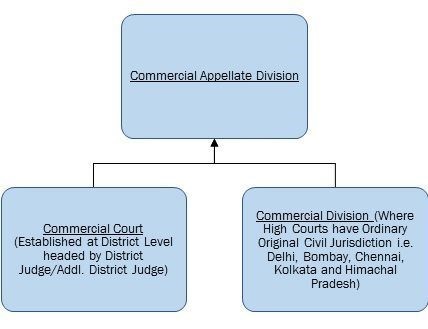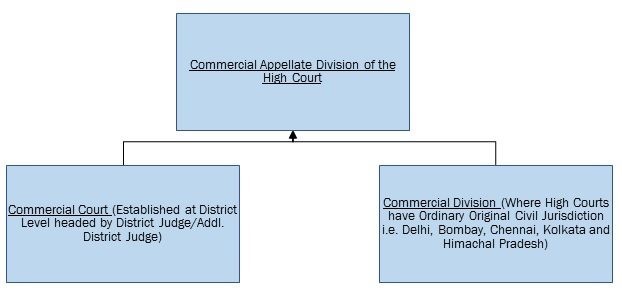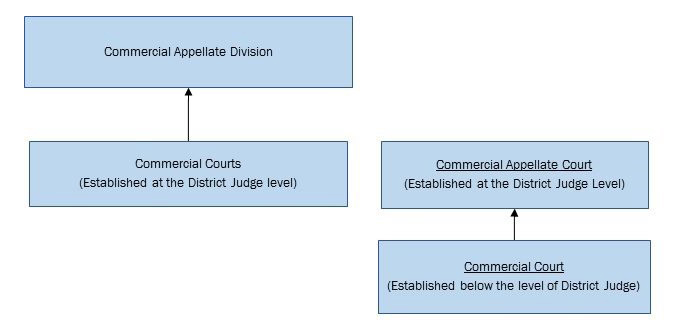Dispute Resolution Hotline: Amendments to the Commercial Courts Act
Posted by By nishithadmin at 16 May, at 18 : 56 PM Print
AMENDMENTS TO THE COMMERCIAL COURTS ACT
This article was originally published in the 15th May 2018 edition of

Highlights of the Amendment
- Minimum Value of dispute (pecuniary jurisdiction) reduced to INR 3,00,000/-
- Commercial courts split in two – (i) District Judge Level & Below District Judge Level
- Commercial Appellate Courts introduced
- Mandatory pre-institution mediation prescribed
- Government to appoint commercial court judges
The Government, on May 3, 2018, promulgated an Ordinance (Ordinance) amending the Commercial Courts, Commercial Division and Commercial Appellate Division of High Courts Act, 2015 (Act). These amendments are an attempt to expand the scope of commercial courts in India. They will also contribute towards improving India’s ranking on the ‘ease of doing business index’ released by the World Bank (Ease of Business Report).
However, it remains to be seen whether the hastily drafted changes incorporated by way of the Ordinance, achieve the desired effect of increased efficiency in the resolution of commercial disputes or whether they add to the chaos of fluctuating jurisdictions of courts in India. The key changes are discussed hereinbelow.
NAME OF THE ACT
The Ordinance amends section 1(1) of the Act, which now states, “this Act may be called the Commercial Courts Act, 2015.”
Comment: The name of the Act prior to the amendment was Commercial Courts, Commercial Division and Commercial Appellate Division of High Courts Act, 2015. It created confusion as to whether these courts were merely a separate division of the High Courts or new courts. If they were merely separate divisions of the High Courts, then the Act did not bring about any significant change given that the High Courts were already functioning with commercial benches.
With the change in name as “Commercial Courts Act, 2015’, it will send a clear message that there are separate courts with different procedures constituted for resolving commercial disputes.
MINIMUM DISPUTE VALUE CHANGED TO INR 3,00,000/-
The Ordinance notably amends the “specified value” as defined under Section 2(2)(i) of the Act, reducing the value from INR 10,000,000/- (Rupees Ten Million) [approx. USD 1,50,000] to INR 300,000/- (Rupees Three Hundred Thousand) [approx. USD 4,500].
Comment: This would bring a large number of disputes within the ambit of the commercial courts which were previously outside their scope. It appears that the intent is to meet the parameters used to gauge enforceability of contracts in World Banks’s Ease of Business Report.
The cases considered for the Ease of Business Report are the ones with claim value worth 200% of income per capita or $5,000, whichever is greater. This lead to data regarding the city civil court being considered for gauging the efficiency of enforcement of contracts in India as opposed to the commercial courts and divisions which were constituted under the Act.
With this change, it is expected that the data of the Commercial Courts constituted under the Act would now be used as the pecuniary jurisdiction starts from INR 300,000/- i.e. approx. USD 4,500.
HIERARCHY OF COMMERCIAL COURTS AND APPELLATE MECHANISMS
The Ordinance (i) introduces Commercial Courts even in jurisdictions where the concerned High courts have Ordinary Original Civil Jurisdiction (“OOC Jurisdiction”)1; (ii) introduces Commercial Appellate Courts, and (iii) splits Commercial courts in two types. These changes are demonstrated in Illustrations below.
Commercial Courts in Jurisdictions where High Courts have Ordinary Original Jurisdiction
Earlier, commercial divisions of High Courts were established in places where High Courts have OOC Jurisdiction. These divisions dealt with commercial disputes of specified value i.e. INR 10,000,000 (Rupees Ten Million) or higher. However, the specified value is now reduced to INR 300,000 (Rupees Three Hundred Thousand). Accordingly, the Ordinance now establishes commercial courts at the level of district judge even in places where High Courts exercise OOC Jurisdiction. The state government may specify the pecuniary jurisdiction of such Commercial Courts. However, the state government cannot specify an amount which is less than three hundred thousand and more than the pecuniary jurisdiction of the District Courts in the said areas.
Comment:
- Overlapping Jurisdiction of Commercial Divisions and Commercial Court: The jurisdiction of Commercial Divisions continue to be linked with the ‘Specified Value’. Given the change in the definition of Specified Value i.e. reduction from ten million to three hundred thousand, it appears that the jurisdiction of Commercial Divisions stands reduced to three hundred thousand. Thus, Commercial Divisions would also have jurisdiction over disputes which fall within the pecuniary thresholds of the Commercial Courts. This may not have been the intent of the government as this would lead to low-value claims being brought before the High Courts. Thereby increasing the burden massively. The language of the ordinance should, therefore, be modified such that the pecuniary jurisdiction of the commercial divisions commences from the value which is the maximum pecuniary jurisdiction of Commercial Courts.
- Impact of Change in Different Jurisdictions:
- Delhi: Given that pecuniary jurisdiction of civil courts is up to twenty million in Delhi, the State Government can constitute Commercial Courts (At the level of District Judge) to deal with Commercial Disputes up to twenty million. Currently, commercial disputes of the value of ten million and above go before the Commercial Division of the High Court2. If the state government does constitute a Commercial Court for disputes up to the value of twenty million it may lead to a reduction of the jurisdiction of the Commercial Division of the High Court;
- Madras & Himachal Pradesh: The pecuniary jurisdiction of the civil courts in Madras3 and Himachal Pradesh4 is less than ten million. Thus, Commercial Disputes, which were of value higher than the pecuniary jurisdiction of the District Courts but less than ten million, were being heard by the High Courts but not by the Commercial Divisions. With the amendment, the effect may be that these commercial disputes would be heard by the Commercial Divisions of such High Courts.
Commercial Court below the level of District Judge in jurisdictions where high courts have no ordinary original jurisdiction
The amendments now make provision for constitution of two types of commercial courts in jurisdictions where the high court does not exercise ordinary original civil jurisdiction being:
- commercial courts at the level of A district judge; and
- commercial court below the level of a district judge.
Comment: The intention behind creating these two types of courts could be linked with the reduction of the specified value. While not stated specifically, it may be that lower value disputes would now be adjudicated by Commercial Courts below the level of a district judge and high-value disputes would go to Commercial Courts at the level of a district judge,
Commercial Appellate Court
The Ordinance further envisages the establishment of commercial appellate courts in jurisdictions where the high court does not exercise OOC Jurisdiction. Appeals from commercial courts below the level of district judge shall lie before the Commercial Appellate Court. The Appeals from Commercial Courts at the District Judge level would continue to lie before the Commercial Appellate Division.
Hierarchy prior to the amendments

POST AMENDMENTS
(where High Courts have ordinary original jurisdiction)

(where high courts do not have ordinary original jurisdiction)

APPOINTMENT OF JUDGES OF COMMERCIAL COURTS
One of the most critical changes introduced through this Ordinance is with respect to the appointment of the judges of commercial courts. Earlier, the state government could appoint those judges only with the concurrence of Chief Justice of the High Court. Whereas, after the amendments, the state government has the power to appoint such judges even without the concurrence of the chief justice of the high courts.
Comment: Given the implications of such provision in relation to the independence of the judiciary and the importance of commercial courts, the constitutionality of this amendment may be amenable to challenge.
INTRODUCTION OF MANDATORY PRE-INSTITUTION MEDIATION
The Ordinance inserts Section 12A in the Act. It entails that where a suit does not contemplate urgent interim relief, the plaintiff has to undergo pre-institution mediation. In this regard, authorities constituted under Legal Services Authorities Act, 1987 will be notified and such authority shall complete the process of mediation within three months from the date of application. It further entails that the settlement arrived at by such mediation shall have the status and effect of an arbitral award under section 30(4) of the Arbitration and Conciliation Act, 1996 (“Arbitration Act”).
Comment: Across the globe experience of such pre-institution mediation provisions have been positive. Thus, the institution of this provision is laudatory. However, a culture of making positive use of such mediation and proper infrastructure with experienced mediators needs to be developed for ensuring that the intent behind such provision is met.
NO TRANSFER OF SUIT ON ACCOUNT OF COUNTER-CLAIM
The Ordinance also deletes Section 9 of the Act and corresponding section 12(e). Section 9 provided for the transfer of suit to commercial courts if the counter-claim is of the ‘Specified Value’ i.e. (now) INR 3,00,000/-.
Comment: It appears that this change has been made considering the reduction of the specified value to three hundred thousand. It may also be noted that pursuant to Order VIII Rule 6A, a counterclaim can only be made up to the pecuniary limit of the jurisdiction of the court.
CONCLUSION
There are clearly positive changes such as commercial courts being constituted for cases of lower value and introduction of pre-institution mediation. However, in certain areas like the jurisdiction of the commercial divisions vis-à-vis the jurisdiction of the commercial courts further clarity is required. Further, the government’s ability to appoint commercial courts judges may raise certain eyebrows. The government’s focus has been on improving the ease of doing business in India, but as discussed the ordinance is more of a mixed bag.
1 Delhi, Bombay, Madras, Calcutta and Himachal Pradesh
2 Smt. Surinder Kaur v. Sh. Gurmeet Singh & Ors., 2015 SCCOnLine Del 13314
3 INR 2,500,000 (Rupees Two Million Five Hundred Thousand Only)
4 INR 1,000,000 (Rupees One Million Only)
IDEX Legal Awards 2015: Best Dispute Management lawyer and Best Dispute Management Firm
World Tax (International Tax Review’s Directory): Recommended Tax Firm in India
Legal 500 2018 : Ranked in Tier 1 for Dispute Resolution, Labour & Employment, Investment Funds, TMT and Tax
Fastest Growing M&A Law Firm in India in 2015: MergerMarket
The Most Innovative Law Firm in Asia-Pacific

DISCLAIMER
The contents of this hotline should not be construed as legal opinion. View detailed disclaimer.






